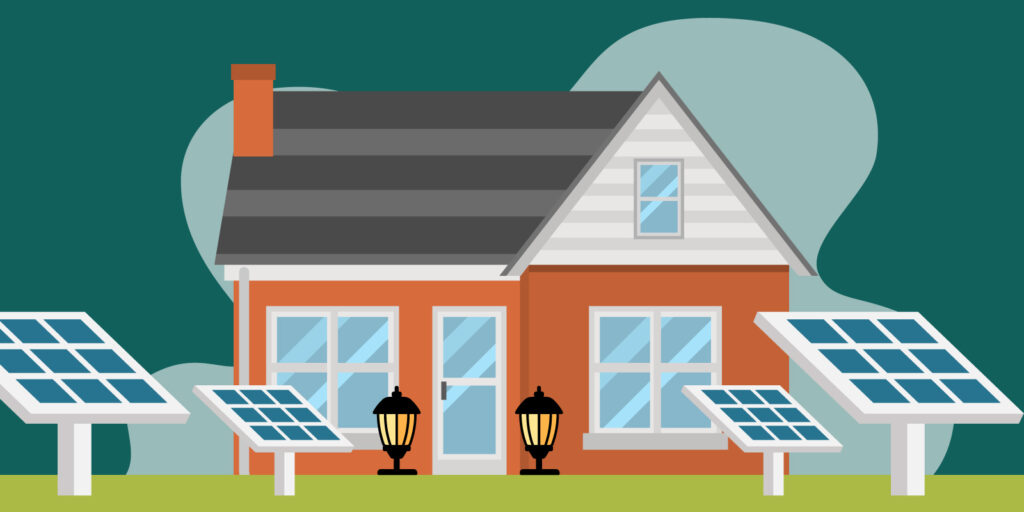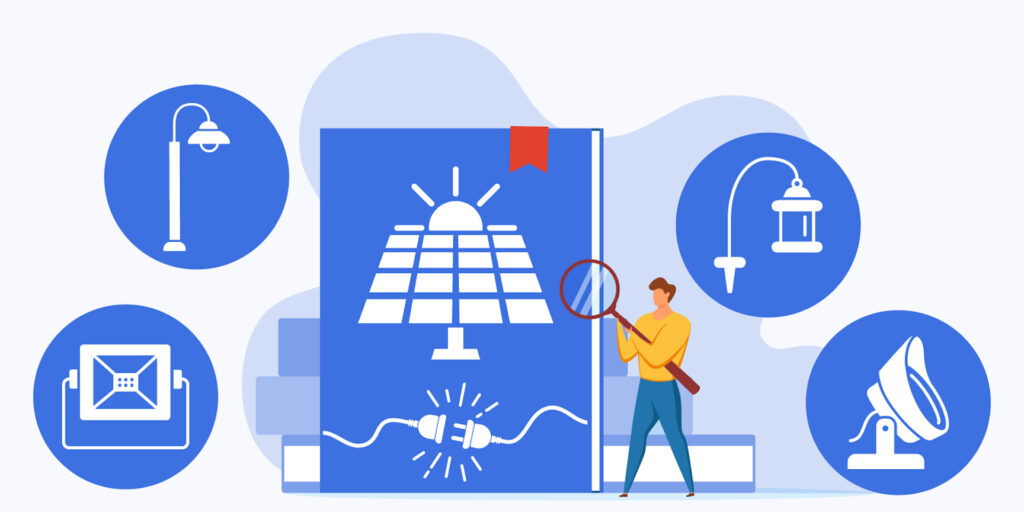Chances are you’ve heard of solar lights before, but do you know how they work and how they came to be?
In a nutshell, solar yard lights are outdoor lighting fixtures that use solar panels to convert sunlight into electricity. The electricity is then used to power the lights, eliminating the need for a traditional power source such as a power grid or a battery.
The use of solar energy dates back to the 7th century BC when the ancient Greeks and Chinese used mirrors to reflect sunlight onto particular areas. Then, in the 18th and 19th centuries, various inventors developed designs for solar cookers and solar-powered engines. Still, it was not until the 20th century that practical and affordable solar lighting systems became available.
In the 1950s, solar cells were developed that were able to convert sunlight into electricity more efficiently, which paved the way for the development of modern solar lighting systems. Today, solar lights are used in a wide range of applications, from streetlights and traffic signals to outdoor lighting for homes and businesses.
Where Can You Use Solar Lights?
Solar lights can be used in a variety of outdoor spaces, including gardens, yards, patios, decks, walkways, driveways, and more. They can also be used to light up outdoor features such as trees, bushes, fences, and other structures.
Solar lights are particularly useful in areas where it is difficult or expensive to install a traditional power source, such as remote locations or areas without access to a power grid. They can also be a convenient and cost-effective option for people who want to add lighting to their outdoor spaces without the need for expensive and inconvenient power cables.
Overall, solar lights are a versatile and convenient option for outdoor lighting, as they can be used in a variety of spaces and situations to provide bright and reliable lighting without the need for a traditional power source. If you install high-quality options, they can also help improve the resale value of your home.
Solar Light Benefits
Here are some of the many benefits of using solar lights.
Saving Money
One of the main benefits of using solar lights is that they can help to save money on energy bills. Because solar lights use sunlight to generate electricity, they do not require electricity from the power grid to operate.
This can be particularly beneficial for people who live in remote areas or who do not have access to a power grid, as they can use solar lights to provide lighting without the need for expensive and inconvenient power cables.
Environmentally Friendly
Another benefit of solar lights is that they are environmentally friendly. Solar panels convert sunlight into electricity through a process known as photovoltaic (PV) conversion, which does not produce any greenhouse gases or other emissions. This makes solar lights a clean and sustainable source of lighting that can help to reduce your carbon footprint.
Long-lasting
Solar lights are designed to be long-lasting and low-maintenance, so they can provide reliable lighting for many years without the need for frequent replacement. Most solar lights have a lifespan of about 10 to 15 years, and because they do not have moving parts or complex electrical components, they are less likely to break or malfunction.
Easy to Install
Solar lights are relatively easy to install, as they do not require a power source or a connection to the power grid. This makes them a convenient option for people who want to add lighting to their outdoor spaces, as they can be installed quickly and easily without the need for special tools or skills.
Versatile
Solar lights are available in a wide range of styles and designs, so they can be used for a variety of purposes, including accent lighting, security lighting, pathway lighting, and more. This makes them a versatile option for outdoor lighting, as they can be used to create a range of different lighting effects to suit your needs and preferences.
What to Look For in Solar Lights
When shopping for solar lights, there are a few key things to consider in order to make sure you choose the best product for your needs. Here are some factors to look for.
Size and style
Solar lights are available in a wide range of sizes and styles, so you can choose the ones that best suit your outdoor spaces and personal preferences. Consider the size and design of the solar lights, as well as the type of lighting they provide (such as accent lighting, security lighting, pathway lighting, etc.).
Solar panel efficiency
Solar panels convert sunlight into electricity, so the efficiency of the solar panels is an important factor to consider when choosing solar lights. Look for solar lights with high-efficiency solar panels, as these will be able to generate more electricity from the same amount of sunlight, providing brighter and more reliable lighting.
Battery capacity
Solar lights typically use rechargeable batteries to store the electricity generated by the solar panels. The capacity of the battery is an important factor to consider, as it determines how long the solar lights will be able to operate on a single charge. Look for solar lights with high-capacity batteries, as these will be able to provide longer-lasting lighting.
Water resistance
If you are planning to use solar lights outdoors, it is important to choose ones that are water-resistant. Look for solar lights with a water-resistant design and a high waterproof rating, as these will be able to withstand rain and other forms of moisture without damaging the lights or the solar panels.
Warranty and customer support
Finally, consider the warranty and customer support provided by the manufacturer or retailer of the solar lights. Look for solar lights that come with a long warranty period and good customer support, as this can provide peace of mind and ensure
What to Avoid with Solar Lights
When using solar lights, there are a few things to avoid in order to ensure that they perform properly and provide reliable lighting.
Placing solar lights in the shade
Solar panels need direct sunlight in order to generate electricity, so it is important to place solar lights in an area where they will receive plenty of sunlight. Avoid placing solar lights in the shade, as this can reduce the amount of sunlight that reaches the solar panels, reducing their efficiency and the amount of electricity they generate.
Using low-quality solar lights
It is important to choose high-quality solar lights, as low-quality ones may not perform well or may not last as long. Avoid using solar lights that are cheaply made or do not have good reviews, as these may not provide reliable lighting or may not be worth the investment.
Not cleaning solar panels regularly
Over time, dust and other debris can accumulate on the surface of solar panels, reducing their efficiency and the amount of electricity they generate. Regular cleaning will prevent dust and debris from building up on the solar panels of your solar lights, keeping them running their best.
Not using high-capacity batteries
Solar lights typically use rechargeable batteries to store the electricity generated by the solar panels. The capacity of the battery is an important factor to consider, as it determines how long the solar lights will be able to operate on a single charge. Avoid using solar lights with low-capacity batteries, as these may not be able to provide enough lighting or may require frequent replacement.
Not replacing damaged or malfunctioning solar lights
Over time, solar lights may become damaged or malfunction, reducing their performance or making them unusable. Avoid using damaged or malfunctioning solar lights, as they may not provide reliable lighting or maybe a safety hazard. If your solar lights become damaged or malfunction, replace them with new ones to ensure that you have reliable outdoor lighting.
Different Solar Light Options

There are many different types of solar lights, and they can be classified based on the type of lighting they provide, their design, and other factors. Here are some of the most common types of solar lights.
Pathway lights
Pathway lights are small, low-level lights that are placed along a walkway or path to provide illumination and guidance. They are typically designed to be low-profile and unobtrusive, and they can be used to create a decorative or functional lighting effect.
Floodlights
Floodlights are large, powerful lights that are used to illuminate a wide area, such as a yard or a driveway. They are typically mounted on a wall or a pole, and they can be adjusted to point in different directions to provide targeted lighting.
String lights
String lights are long strands of small, decorative lights that can be hung or wrapped around objects to create a festive or romantic lighting effect. They are often used to decorate trees, bushes, fences, or other outdoor structures, and they are available in a wide range of styles and colors.
Spotlights
Spotlights are small, focused lights that are used to highlight specific objects or areas. They are typically mounted on a wall or a stake, and they can be adjusted to point in different directions to provide targeted lighting.
Motion-sensor lights
Motion-sensor lights are lights that are equipped with sensors that detect movement. When movement is detected, the lights turn on.
The Top 4 Solar Light Companies
There are many companies that manufacture and sell solar lights, but here are the four most common names in the industry you’ll want to look for as you shop around. Keep in mind that the best options for you will vary depending on your needs and preferences.
Solario
Solario is a leading solar light manufacturer that offers a wide range of solar lighting products, including pathway lights, flood lights, string lights, spotlights, and more. The company’s solar lights are known for their high-quality, long-lasting performance, and they come with a 10-year warranty for added peace of mind.
Gigalumi
Gigalumi is a popular solar light brand that offers a wide range of products, including pathway lights, string lights, spotlights, and more. The company’s solar lights are known for their stylish designs and durable construction, and they come with a 12-month warranty for added protection.
Sunforce
Sunforce is another leading solar light manufacturer that offers a wide range of products, including flood lights, motion-sensor lights, spotlights, and more. The company’s solar lights are known for their high-quality, long-lasting performance, and they come with a 1-year warranty for added protection.
LITOM
LITOM is a popular solar light brand that offers a wide range of products, including pathway lights, flood lights, string lights, spotlights, and more. The company’s solar lights are known for their high-quality, long-lasting performance, and they come with a 2-year warranty for added protection.
Solar Light Lifespan
The lifespan of solar lights varies depending on a number of factors, including the quality of the solar lights, the amount of sunlight they receive, and the amount of use they get. On average, solar lights have a lifespan of about 10 to 15 years.
However, it is important to note that the actual lifespan of a solar light may be shorter or longer than this average. High-quality solar lights that receive plenty of sunlight and are used regularly may last for many years, while low-quality solar lights that receive little sunlight and are not used frequently may have a shorter lifespan.
Overall, the lifespan of solar lights can vary, but most are designed to provide reliable lighting for at least 10 to 15 years.
Are Solar Lights Worth The Investment?
The benefits of using solar lights include cost savings, environmental friendliness, long-lasting performance, easy installation, and versatility. These benefits make solar lights an attractive option for outdoor lighting, as they can provide a cost-effective and sustainable way to light up outdoor spaces without the need for a traditional power source.
You might also be interested in: The Top 12 Reasons To Switch To Solar Energy Today




